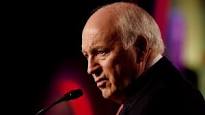Cheney: Putin made 'a very serious effort' to interfere in US election
Former Vice President Dick Cheney said in a speech Monday that Russia's alleged involvement in the election could be considered "an act of war."
"There was a very serious effort made by (Russian President Vladimir) Putin and his government, his organization, to interfere in major ways with our basic, fundamental democratic processes," Cheney said at the Economic Times Global Business Summit in New Delhi, India. "In some quarters that would be considered an act of war."
Cheney, who made clear that he didn't "speak for anybody else" before offering his assessment of threats posed by Putin, said to expect Russia to continue these kind of efforts "going forward" and accused the Russian President of trying to influence past elections in Baltic countries; he added. however, that Russia had not undermined the legitimacy of President Donald Trump's electoral victory.
"I would not underestimate the weight that we, as Americans, assign to the Russian attempts to interfere with our internal political processes," Cheney said.
Unlike former President George W. Bush, whom he served as vice president, Cheney said he supported Trump, and was happy to do so.
The US intelligence community has publicly accused Russia of being behind several hacks and information dumps, including against the Democratic National Committee and John Podesta, Hillary Clinton's campaign chairman. Russia has denied the charge, which is central to investigations in the US House and Senate as well as the Trump administration.
Cheney also warned of Russian military aggression and the potential destabilization Putin could bring.
"He is doing everything he can to find ways to undermine NATO," Cheney said.
The former vice president fondly recalled the initial post-Cold War period and said times had changed for the worse in some ways.
At the beginning of the Bush administration, the US had a closer relationship with Russia, but the relationship deteriorated significantly by the end of Bush and Cheney's time, following the war in Iraq, the growth of NATO since the fall of the Soviet Union and Russia's aggression in Eastern Europe.
News Courtesy: www.cnn.com











